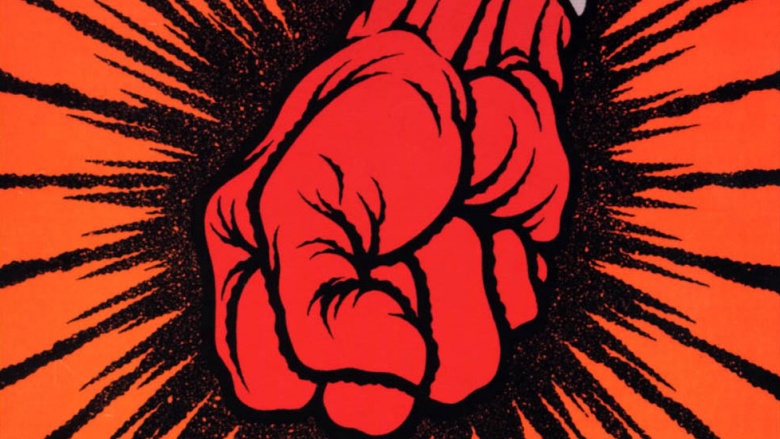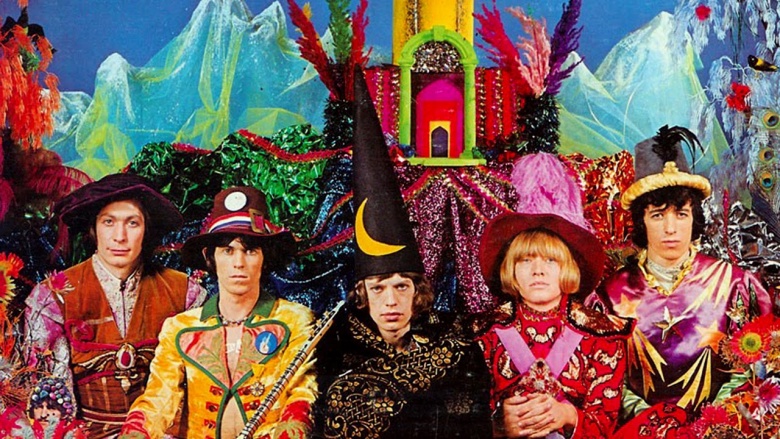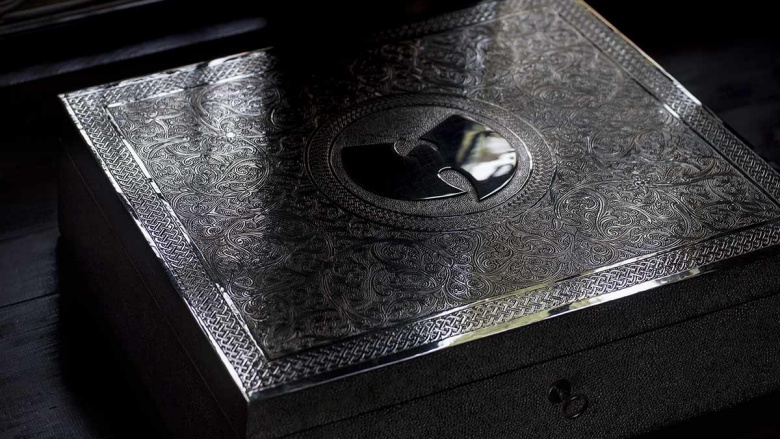'Experimental' Albums That Didn't Work At All
Some musicians are fine with putting out the same record over and over again, because creative stagnation is the ultimate sign of badass rockery. That, and they see what happens when other musicians experiment with a new sound...and fall flat on their faces. Here are some of the worst examples of what happens when rock stars attempt something out of their wheelhouse and fail miserably.
Metallica: St. Anger
Almost from the start, Metallica didn't want to be known as a mere thrash band. That's why, just two albums in, they were writing ballads and acoustic guitar intros, instead of just chugging power chords forever. Sometimes, their experiments worked—the blues metal of Load and Re-Load sounded great, as did backing up their music with an orchestra in S&M. But 2004's St. Anger? That most certainly did not work.
Metallica attempted to craft an unrehearsed, barely-produced, grimy, dirty garage-band sound, all live in the studio, with minimal edits or overdubs. While this could have turned out fine, it so didn't. James Hetfield's lyrics were Kindergarten-level quality at best. His voice cracked and squeaked like he was going through Adolescence Part II, Lars Ulrich's drumming was drowned out by a snare drum so loud, repetitive, and obnoxious it would've been more fun to get hit over the head with Big Ben. They tuned their guitars so low it's amazing their strings didn't drag across the floor. And they completely eschewed solos because writing and perfecting them would have taken too damn long. And of course, they dragged this sludge out for 75 minutes, approximately 74 minutes after most fans started begging for the sandman to take them away.
Kiss: Music From 'The Elder'
By 1981, everyone knew what Kiss was about: rocking hard, and making money. But their last couple albums were softer and poppier, and their merchandising efforts were through the roof, leaving many fans to wonder if they were done as a hard-rock act with actual integrity. In response, Kiss recorded Music From "The Elder," which was technically a return to their loud, heavy, almost-evil roots. But, rather than just re-make "God Of Thunder," the band wrote an ambitious, orchestra-heavy concept album about a boy (cleverly named "The Boy") being trained by an elder named Morpheus to join the Order Of The Rose, an underground crime-fighting organization. It went over even worse than you'd expect. Old-school Kiss fans found it bloated and ridiculous, and new fans were just plain confused because nothing sounded like "I Was Made For Loving You."
But hey, music works best when played live, so surely an awesomely theatrical Elder tour would help convert fans and boost sales, right? Wrong. Sales and reception were so bad, Kiss didn't even tour to support the album. They simply went into hiding until the mean laughter went away. When they emerged, they recorded a basic rock album without any stupid storylines. Record sales (and cheesy merchandise sales) picked up almost immediately.
Rolling Stones: Their Satanic Majesties Request
When the Rolling Stones started, they provided a gritty alternative to the clean-cut, suit-wearing, aw-shucks Beatles. But by 1967, the Beatles had evolved into the biggest, most innovative (and still popular) band in the world. "So," the Stones figured, "if the Lads can successfully experiment with their sound, why can't we?" And so, they recorded Their Satanic Majesties Request—a psychedelic, Sgt. Pepper-esque trip as far removed from "Jumping Jack Flash" as you can get without abandoning music altogether. However, unlike the Beatles, who at this point could still work together well enough to make a cohesive record, the Stones were a mess. They barely recorded together, got caught up in multiple drugs busts and trips, and would regularly arrive with entourages of a dozen-plus hangers-on and groupies who only distracted whomever actually wanted to work that day. Yoko didn't break up the Beatles, but dozens of her almost destroyed the Stones.
The public sensed all this and spat on the album almost immediately, dismissing it as a meandering rip-off. The Stones even aped Pepper's album cover, minus the gaggle of famous people. The Stones got the point, and by their next album had reverted to the basic Rolling Stones sound they're best known for. They haven't deviated from it since, and probably won't until at least the Seventh Intergalactic Nuclear War.
Garth Brooks: Chris Gaines' Greatest Hits
As dismally as everybody above failed, at least they experimented under their own name. Country music star Garth Brooks, meanwhile, attempted to record non-country music in 1999, but only under somebody else's completely made-up moniker. He grew weird hair, shaved his goatee down to a soul patch, and recorded a bunch of rock songs as "Chris Gaines." Even more bafflingly, he pretended he and Gaines were separate people, recording a VH1 Behind The Music episode as Gaines, and even hosting Saturday Night Live as himself, with Gaines as his musical guest. Even more more bafflingly, he called his Gaines album Greatest Hits, confusing people into thinking Gaines was an actual (failed) musician they had somehow never heard of. Even more more more bafflingly, the album was meant as the soundtrack to a movie called The Lamb, supposedly about Gaines' life and career, that wouldn't be released until the following year.
Did you watch that movie? No you didn't, because it never got released. The soundtrack sold so poorly, and the whole "other person" concept so confused and frustrated virtually everybody, that the movie went into permanent Nope Mode. Garth Brooks immediately reverted to being Garth Brooks, and Chris Gaines went into a blissful slumber from which, 17 years later, he has mercifully not awakened.
The Wu-Tang Clan: Once Upon A Time In Shaolin
It's impossible to say if Once Upon A Time In Shaolin failed musically. Apparently, it returns the Wu-Tang Clan to their roots, which would be wonderful if we could hear it. But we can't, and that's the problem. See, the Wu released exactly one copy of Shaolin, claiming to draw inspiration from Baroque and Renaissance royalty commissioning musicians to compose music for their ears only. Their single copy would be auctioned off to the highest bidder, who couldn't resell it until 2103, by which point they'd likely be too dead to do so anyway. However, the buyer could play the album at listening parties or museums for free, which theoretically would spread the Wu's art around as non-commercially as possible.
However, the experiment shattered to pieces thanks to the guy who bought the album: Martin Shkreli, the "pharma-bro" who raised the price of an AIDS pill from $13 to $750 while publicly smirking about it like a real-life '80s dramedy villain. Because he seems to act like a person who hates you simply because you are not money, Shkreli has outright admitted he spent $2 million to "keep it from the people," as reported by Reuters. That means he will never play the album in public, will never let anyone hear it but himself, and will presumably be buried with it blaring eternally in his coffin's built-in speakers. And sadly, the Internet rumor that suggested the Wu's (and Bill Murray) could legally steal back the album wound up being untrue, so unless Shkreli has a come-to-Big-Baby-Jesus moment, the Shaolin experiment can only be considered a well-intentioned, crashing failure.





